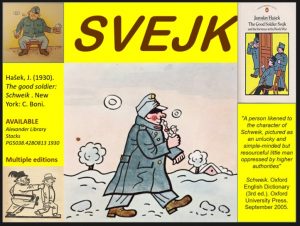 A copy of The Good Soldier Švejk by Czech humorist-anarchist-writer, Jaroslav Hašek, is the book I have kept around me all my life. In my office I also display a sketch by Josef Lada, who illustrated the full novel, which was originally published in weekly installments in 1921-1923. A symbol of passive resistance by means of incompetence and idiocy (whether it’s faked or real is undetermined and irrelevant), Švejk, an alcoholic dog thief by profession, pulls off the ultimate survival stunt in the Austro-Hungarian Army in a diverse, multi-ethnic environment during World War I.
A copy of The Good Soldier Švejk by Czech humorist-anarchist-writer, Jaroslav Hašek, is the book I have kept around me all my life. In my office I also display a sketch by Josef Lada, who illustrated the full novel, which was originally published in weekly installments in 1921-1923. A symbol of passive resistance by means of incompetence and idiocy (whether it’s faked or real is undetermined and irrelevant), Švejk, an alcoholic dog thief by profession, pulls off the ultimate survival stunt in the Austro-Hungarian Army in a diverse, multi-ethnic environment during World War I.
A hilarious satire of all dictatorship, the book is a treasure trove of stereotypes presented in Hašek’s absurdist style, portraying traits (particularly the ineptitude of authority figures) not only through their actions but also via their style and language register in bizarre, farcical situations. Švejk is an equal-opportunity crude satire, mocking everyone and everything, regardless of socioeconomic status––sparing no authority, such as the police, the military or the church.
 In a world of self-proclaimed hierarchy full of bullies, this simple-minded little guy still charms our 21st-century first-world socks off with his semi-simplisictic wisdom and his resourcefulness in practicing a basic instinct of all humans and animals: self-preservation. With its obscenities, vulgar language, and unprecedented sarcasm all still familiar, as the abnormal seems to be the new normal, The Good Soldier Švejk has stood the test of time for me.
In a world of self-proclaimed hierarchy full of bullies, this simple-minded little guy still charms our 21st-century first-world socks off with his semi-simplisictic wisdom and his resourcefulness in practicing a basic instinct of all humans and animals: self-preservation. With its obscenities, vulgar language, and unprecedented sarcasm all still familiar, as the abnormal seems to be the new normal, The Good Soldier Švejk has stood the test of time for me.

More in the series
- The Best of Roald Dahl by Roald Dahl (stories for adults by author popular with children) – read the post by Julie Rossano
- The Fifth Season by N K Jemisin and The House in the Cerulean Sea by TJ Klune (one for the brain, one for the heart) – read the post by Jenny Coffman
- The Arcades Project by Walter Benjamin (1927-40, unfinished work of cultural criticism) – read the post by Nick Allred